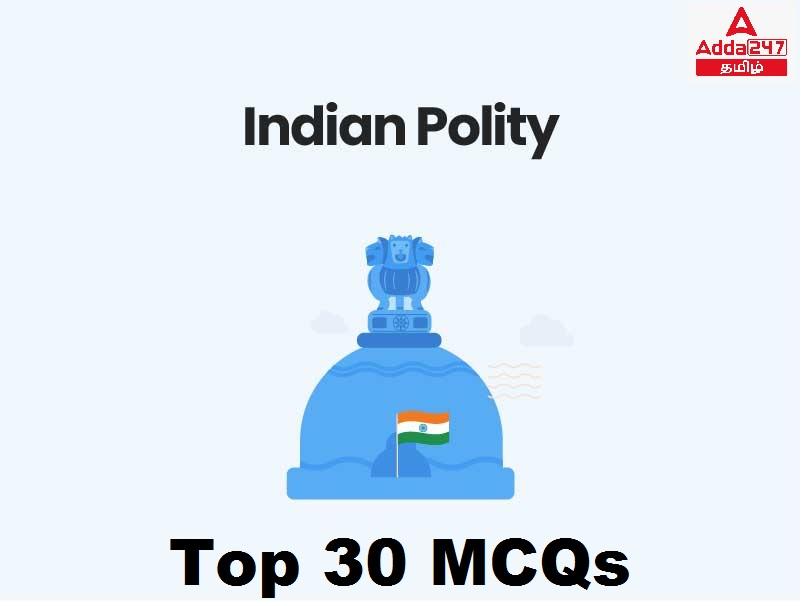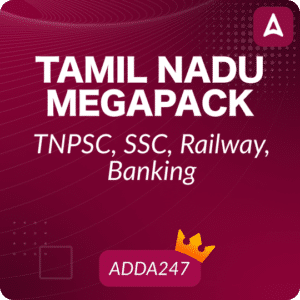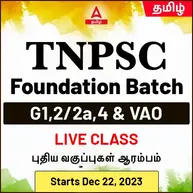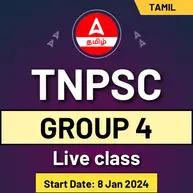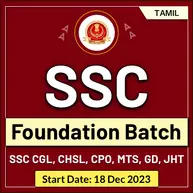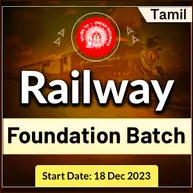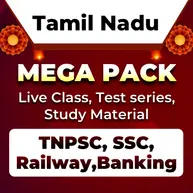பல்வேறு போட்டித் தேர்வுகளில் இந்திய அரசியலமைப்பு முக்கியப் பங்காற்றுகிறது, விண்ணப்பதாரர்களுக்கு அவர்களின் தயாரிப்பில் உதவ, நாங்கள் 30 கேள்விகளை (MCQs) தொகுத்துள்ளோம். உங்கள் இந்திய அரசியலமைப்பு அறிவை மேம்படுத்துவதற்கும், வரவிருக்கும் தேர்வுகளுக்கு உங்களை சிறப்பாக தயார்படுத்துவதற்கும் ஒவ்வொரு கேள்விக்கும் சரியான பதில் உள்ளது.
Q1. Match the following acts with their respective years of enactment:
- Prevention of Black Marketing and
maintenance of supplies of essential Commodities Act A 1980
- The Legal Metrology Act B 2009
- The Bureau of Indian Standards Act C 1986
- The Essential Commodities Act D 1955
(a) 1-A, 2-B, 3-C, 4-D
(b) 1-D, 2-A, 3-C, 4-B
(c) 1-A, 2-B, 3-D, 4-C
(d) 1-D, 2-B, 3-C, 4-A
Q2. Who started the SNDT University in Pune with five students in 1916?
(a) Sarojini Naidu
(b) Vijaya Lakshmi Pandit
(c) Sushma Swaraj
(d) Maharshi Karve
Q3. Who was the first woman governor of Independent India in charge of the United Provinces?
(a) Maharshi Karve
(b) Vijaya Lakshmi Pandit
(c) Sushma Swaraj
(d) Sarojini Naidu
Q4. Who became the first woman president of the UN General Assembly in 1953?
(a) Maharshi Karve
(b) Vijaya Lakshmi Pandit
(c) Sushma Swaraj
(d) Sarojini Naidu
Q5. Who was the first woman prime minister of India?
(a) Maharshi Karve
(b) Vijaya Lakshmi Pandit
(c) Indira Gandhi
(d) Sarojini Naidu
Q6. Who became the first woman IPS Officer of India in 1972?
(a) Maharshi Karve
(b) Vijaya Lakshmi Pandit
(c) Kiran Bedi
(d) Sarojini Naidu
Q7. Who was the first woman to win the Nobel Peace Prize in 1979?
(a) Mother Teresa
(b) Vijaya Lakshmi Pandit
(c) Maharshi Karve
(d) Sarojini Naidu
Q8. Who became the first woman Chief Minister of an Indian State?
(a) Maharshi Karve
(b) Vijaya Lakshmi Pandit
(c) Sucheta Kripalani
(d) Sarojini Naidu
Q9. Who was the first woman judge in the Supreme Court of India?
(a) Maharshi Karve
(b) Meera Sahib Fatima Bibi
(c) Vijaya Lakshmi Pandit
(d) Sarojini Naidu
Q10. Who was the first Indian woman president of the Indian National Congress?
(a) Maharshi Karve
(b) Vijaya Lakshmi Pandit
(c) Annie Besant
(d) Sarojini Naidu
Q11. Who coined the term Gross National Happiness?
(a) Ugyen Wangchuck
(b) Jigme Wangchuck
(c) Jigme Dorji Wangchuck
(d) Jigme Singye Wangchuck
Q12. Which committee was appointed by the planning commission in 1957?
(a) Balwant Rai Mehta
(b) Ashok Mehta
(c) GVK Rao
(d) L M Singhvi
Q13. In Tamilnadu, the Piped water supply scheme was implemented in _____ by Periyar.
(a) 1917
(b) 1919
(c) 1918
(d) 1920
Q14. When was the Ashok Mehta Committee established?
(a) 1957
(b) 1977
(c) 1985
(d) 1986
Q15. What is the name of the Parliament of the United States?
(a) Folketing
(b) Storting
(c) Congress
(d) Diet
Q16. Which cabinet is called the “Kitchen Cabinet”?
(a) Unitary Form of Government
(b) Federal form of government
(c) Parliamentary form of government
(d) The presidential form of government
Q17. The members can be nominated by The President of India is ______-
(a) 12 members to Lok Sabha
(b) 14 members of Rajya Sabha
(c) 12 members to Rajya Sabha
(d) 14 members of Rajya Sabha
Q18. Which book mentions that an autonomous village community was the basic unit of the local government?
(a) Arthashastra
(b) Tholkaappiyam
(c) Chanakya neeti
(d) None of these
Q19. The Right of children to free and compulsory Education (RTE) Act was implemented in ______
(a) 2008
(b) 2009
(c) 2010
(d) 2007
Q20. India signed the Brasilia Declaration on Road Safety in _____.
(a) 2016
(b) 2015
(c) 2019
(d) 2010
Q21. Which of the following describes India as a secular state?
(a) Fundamental rights
(b) Directive principles of state policy
(c) Fifth schedule
(d) Preamble of the constitution
Q22. The party with more than _____ elected candidates (MLA) are invited by the governor to form the Government in Tamilnadu.
(a) 112
(b) 116
(c) 115
(d) 118
Q23. Which Article guarantees equality of opportunity in public employment?
(a) Article 15
(b) Article 16
(c) Article 25(1)
(d) Article 26
Q24. The National Human Rights Commission was constituted in ______.
(a) 1990
(b) 1993
(c) 1978
(d) 1979
Q25. _____ is the basic marking on roads.
(a) Broken white line
(b) Solid white line
(c) Single solid Yellow lines
(d) Double solid yellow lines
Q26. _____ is marked before the pedestrian crossing.
(a) Solid line
(b) Broken line
(c) Stop line
(d) Edge line
Q27. Best example for Informatory Signs in road safety rules?
(a) No Parking
(b) Right Hand Curve
(c) School Ahead
(d) Pedestrian Crossing
Q28. The Madras Regiment originated in the year ______.
(a) 1758
(b) 1962
(c) 1845
(d) 1756
Q29. The first Lok Adalat was held in _____.
(a) 1978
(b) 1979
(c) 1980
(d) 1982
Q30. The E-Courts project was established in ____.
(a) 2000
(b) 2003
(c) 2005
(d) 2006
Solution:
S1. (a)
- The Consumer Protection Act, 1986
- The Legal Metrology Act, 2009
- The Bureau of Indian Standards Act, 1986
- The Essential Commodities Act, 1955
- The Prevention of Black Marketing and Maintenance of Supplies of Essential Commodities Act, 1980
S2. (d)
The SNDT University in Pune was started by Maharshi Karve with five students in 1916. SNDT University, which stands for Shreemati Nathibai Damodar Thackersey Women’s University, was the first women’s university in India and played a significant role in promoting women’s education and empowerment.
S3. (d)
Sarojini Naidu, a prominent freedom fighter and poet, became the first woman governor of Independent India in charge of United Provinces (now known as Uttar Pradesh). She held this position from 1947 to 1949.
S4. (b)
Vijaya Lakshmi Pandit, an Indian diplomat and politician, became the first woman president of the UN General Assembly in 1953. She served as the president of the 8th session of the UN General Assembly and was the first woman to hold this prestigious position.
S5. (c)
Indira Gandhi, the daughter of India’s first Prime Minister Jawaharlal Nehru, became the first woman prime minister of India. She served as the Prime Minister from 1966 to 1977 and again from 1980 until her assassination in 1984.
S6. (c)
Kiran Bedi became the first woman IPS Officer of India in 1972. She joined the Indian Police Service (IPS) and paved the way for other women to enter the male-dominated field of law enforcement. She was the 24th Lieutenant Governor of Puducherry from 28 May 2016 to 16 February 2021
S7. (a)
Mother Teresa, a renowned humanitarian and nun, became the first woman to win the Nobel Peace Prize in 1979. She dedicated her life to serving the poor and disadvantaged, particularly in Kolkata, India.
S8. (c)
Sucheta Kripalani became the first woman Chief Minister of an Indian State. She served as the Chief Minister of Uttar Pradesh from 1963 to 1967.
S9. (b)
Meera Sahib Fatima Bibi was the first woman judge in the Supreme Court of India. She was appointed as a judge in 1989 and served with distinction on the highest judicial body in the country.
S10. (d)
Sarojini Naidu, in addition to being the first woman governor of United Provinces, was also the first woman president of the Indian National Congress. She presided over the Congress session in 1925.
Annie Besant was the first women president of the INC in 1917.
S11. Ans: (d)
Sol.
The term ‘Gross National Happiness” was coined by the fourth king of Bhutan, Jigme Singye Wangchuck, in the 1970s. The GNH’s central tenets are: “Sustainable and equitable socio-economic development; environmental conservation; preservation and promotion of culture; and good governance”.
S12. Ans: (a)
Sol.
Balwant Rai Mehta Commitee (1957)
Three-tier Panchayati Raj system-gram panchayat at village level (direct election). panchayat Samiti at the block level and Zila Parishad at the district level (indirect election).
S13. Ans: (b)
Sol.
Periyar E. V. Ramasamy became the Chairman of Erode Municipality in 1917. Piped water supply scheme was implemented in 1919 by Periyar. This scheme was said to be first of kind in the history of Indian Municipal administration
S14. Ans: (b)
Sol.
Ashok Mehta Commitee (1977-1978) Two-tier system and political parties should participate at all levels in the elections. It was established by the Janata Government to study about Panchayati raj institutions
S15. Ans: (c)
Sol.
(a) Folketing – Denmark
(b) Storting – Norway
(c) Congress – U.S.A
(d) Diet – Japan
S16. Ans: (d)
Sol.
The Presidential Form Of Government is also known as a non-parliamentary or fixed executive system of government, basically built on the principle of separation of power and is prevalent in the USA, Brazil, Russia and Sri Lanka among others. The President governs with the help of a cabinet or a smaller body called ‘Kitchen Cabinet.
S17. Ans: (c)
Sol.
Members of the Rajya Sabha, the Upper House of the Indian Parliament, are elected by an electoral college consisting of elected members of the legislative assemblies of the states and the Union Territories of India. The President of India nominates 12 members for their contributions to art, literature, science and social services.
S18. Ans: (a)
Sol.
Chanakya’s Arthashastra mentions that in ancient India, an autonomous village community was the basic unit of the local government. It contains plenty of details about the administrative system followed by Mauryas during Chandragupta’s rule. It also talks about the political system, economic policy, taxation, defence strategies, punishments and much more.
S19. Ans: (b)
Sol.
The Right of children to free and compulsory Education (RTE) Act, 2009, means that every child has a right to formal Elementary Education. This right of children provides free and compulsory education till the completion of elementary education in a neighbourhood school. The child need not pay any kind of fee for completing elementary education.
S20. Ans: (b)
Sol.
Brasilia Declaration on Road Safety is the Second Global High level Conference on Road Safety co-sponsored by the WHO. Taking road safety as a serious issue, India signed the Brasilia Declaration in 2015 through which the participants across the world are committed to improve road safety and ways to reduce the traffic deaths by the end of this decade.
S21. Ans:(d)
Sol.
A secular nation means that equal treatment is given to all religions of the state. The Preamble to the Constitution stated that India was a secular nation after the 42nd Amendment of the Constitution of India was enacted in 1976.
S22. Ans: (d)
Sol.
In Tamil Nadu there are 234 legislative constituencies. The party with more than 118 elected candidates (MLA) are invited by the governor to form the Government.
S23. Ans: (b)
Sol.
(a) Article 15 – prohibition of discrimination on – grounds of religion, caste, sex or place of birth etc.,
(b) Article 16 – equality of opportunity in public employment.
(c) Article 25(1) – guarantees the freedom of conscience and the right to profess, practice and propagate religion individually.
(d) Article 26 – Freedom to manage religious affairs
S24. Ans: (b)
Sol.
The National Human Rights Commission (NHRC) of India was established on 12th October, 1993.
S25. Ans: (a)
Sol.
Broken white line – basic marking on roads. you may change lanes, and are allowed to overtake a vehicle or take U turn if it is safe to do so.
S26. Ans: (c)
Sol.
Stop line – This is marked before the pedestrian crossing and sets the deadline where a car should stop before a traffic signal.
S27. Ans: (a)
Sol.
Informatory Signs: These signs provide information to the drivers via boards.
Eg: Public Telephone, Fuel, Hospital, Eating Place, No Parking
S28. Ans: (a)
Sol.
The Madras Regiment is one of the oldest infantry regiments of the Indian Army, originating in the year 1758. The Regimental Centre is at Wellington, Udhagamandalam, Tamil Nadu.
S29. Ans: (d)
Sol.
Lok Adalat: Lok Adalat was set up to provide speedy justice. It hears and settles the disputes in the language of the people in the public presence. A Lok Adalat is presided over by a retired judge along with a lawyer and a social worker. Cases are put forward without advocates. These cases are solved through mutual consent. The first Lok Adalat was held in 1982 at Junagadh of Gujarat.
S30. Ans: (c)
Sol.
E-Courts: The E-Courts project was established in 2005. According to the project all the courts will get computerized. Judicial service center is the part of e-court. The public as well as the advocates can directly ask the case status and next hearing dates free of cost.
**************************************************************************
| Adda247 TamilNadu Home page | Click here |
| Official Website=Adda247 | Click here |

